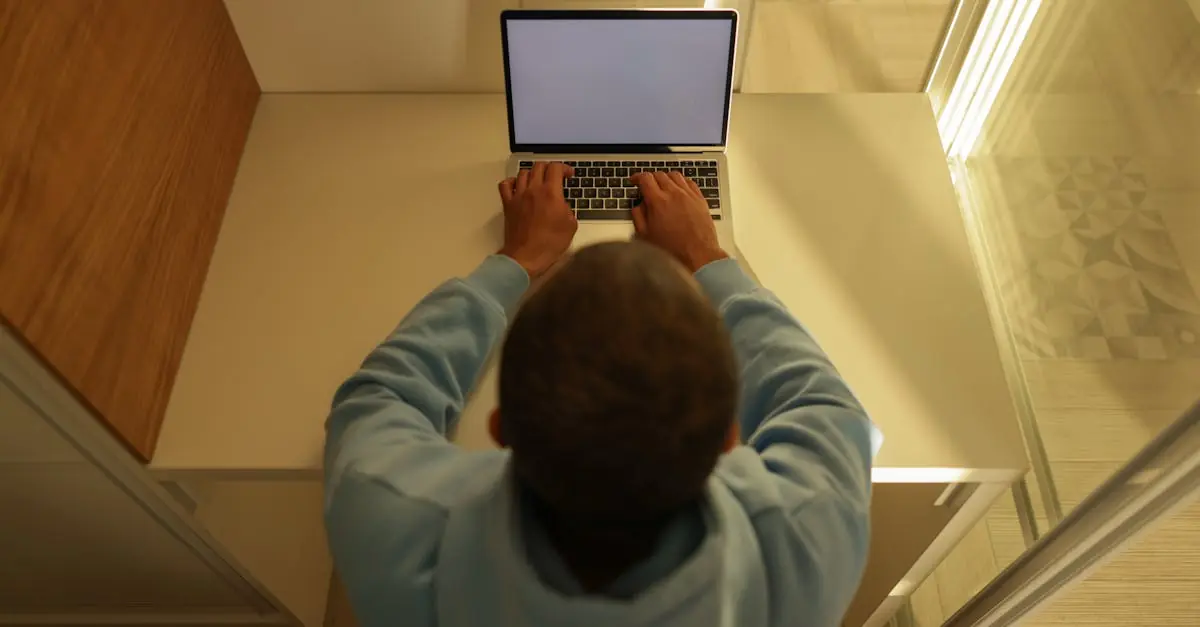In a world where pajama pants are the new power suits, mastering remote work has never been more crucial. With the right strategies, anyone can transform their home office from a chaotic coffee-stained corner into a productivity powerhouse. Who knew that a little organization and a splash of discipline could turn the couch into a throne of success?
Table of Contents
ToggleUnderstanding Remote Work
Remote work has gained popularity as organizations embrace flexibility. It allows individuals to balance their professional and personal lives effectively.
The Rise of Remote Work
Remote work saw significant growth due to advancements in technology. Many companies transitioned to virtual environments during the pandemic, discovering new ways to maintain productivity. According to a recent report, 74% of companies plan to permanently adopt remote work options. This shift changes workplace dynamics, emphasizing trust and outcome-based performance instead of monitoring.
Benefits of Remote Work
Remote work offers numerous advantages for employees and employers. Increased flexibility allows individuals to create schedules that suit their lifestyles. Additionally, studies show that remote workers often experience higher job satisfaction, leading to improved retention rates. Cost savings emerge for both parties, with companies reducing overhead costs while employees save on commuting and daily expenses. Enhanced work-life balance also contributes to overall well-being, promoting a happier, more productive workforce.
Setting Up Your Workspace
Creating an effective workspace significantly enhances productivity while working remotely. A well-organized area allows individuals to focus and maintain discipline.
Choosing the Right Location
Selecting an appropriate location impacts overall work efficiency. Isolating oneself in a quiet space minimizes distractions and fosters concentration. Natural light contributes positively, enhancing mood and alertness. Designating a specific area for work encourages setting boundaries between professional and personal life. Avoid common spaces where family or roommates gather; they can interfere with concentration. Utilizing corners or rooms with minimal foot traffic helps maintain focus and efficiency.
Essential Tools and Equipment
Equipping the workspace with essential tools is crucial for success. Computers and reliable internet connections are the backbone of remote work. Comfortable chairs enhance posture and prevent fatigue. Desk organization items like trays or dividers improve accessibility and reduce clutter. Noise-canceling headphones can increase concentration in a busy environment. Incorporating plants or personal touches to the space fosters a motivating atmosphere. Overall, having the right equipment boosts efficiency and job satisfaction.
Time Management Techniques
Effective time management remains crucial in remote work environments. Employing structured methods enhances productivity and focus.
Prioritizing Tasks
Prioritizing tasks directs attention to the most important responsibilities first. Identifying high-priority tasks increases efficiency in daily operations. Using techniques like the Eisenhower matrix helps distinguish between urgent and important tasks. This method allows workers to focus on what truly impacts their goals. Tracking tasks using tools like Todoist or Trello promotes organization. Regularly reviewing and adjusting priorities can adapt to evolving work demands, ensuring relevant efforts align with immediate business needs.
Using Time Blocks
Using time blocks enhances concentration and mitigates distractions. Scheduling specific time periods for each task promotes structured work hours. For instance, allocating focused blocks of 25 minutes for deep work can boost efficiency. The Pomodoro Technique encourages breaks after work intervals, aiding mental clarity. Setting time limits encourages urgency and maintains momentum. Integrating tools like Google Calendar or Clockify assists with tracking these blocks. Regularly reassessing time blocks can ensure alignment with personal and team objectives, facilitating consistent progress overall.
Communication Strategies
Effective communication enhances remote work efficiency. Clear channels contribute to better team dynamics and project outcomes.
Tools for Effective Communication
Utilize platforms like Slack and Microsoft Teams for instant messaging. Video conferencing solutions such as Zoom and Google Meet facilitate face-to-face interactions. Project management tools, including Asana and Trello, help track progress and assign tasks. Email remains a reliable method for formal communication, allowing for detailed discussions. Integrating these tools fosters a streamlined communication flow.
Maintaining Team Collaboration
Encourage regular check-ins to promote accountability within teams. Daily or weekly meetings create opportunities to share updates and address challenges. Utilize collaborative documents through Google Workspace to ensure everyone stays informed. Emphasizing shared goals enhances team cohesion and collective motivation. Foster an inclusive environment by welcoming input from all team members, reinforcing collaboration as a priority.
Staying Motivated and Productive
Staying motivated and productive in a remote work environment requires intention and strategic planning. Implementing effective strategies enhances overall performance.
Setting Boundaries
Establishing boundaries forms the foundation for successful remote work. Designating specific work hours helps signal when to focus on tasks and when to unwind. Communicating these hours to family or housemates minimizes interruptions. Creating a distinct workspace also separates professional responsibilities from personal life. Parents or caregivers benefit from setting limitations that allow uninterrupted time for work, ensuring greater focus and output.
Creating a Daily Routine
A structured daily routine fosters consistency and enhances productivity. Starting each day with a set schedule prepares individuals to tackle their tasks effectively. Incorporating regular breaks helps maintain energy levels and combat burnout. Utilizing tools like calendars or planners provides a visual guide for task management. Committing to a morning ritual, such as exercise or reading, can create a positive mindset for the day ahead. Engaging in end-of-day reviews also reinforces productivity by assessing accomplishments and planning for the following day.
Mastering remote work is more than just a trend; it’s a vital skill for today’s professionals. By implementing effective strategies and creating a well-organized workspace, individuals can significantly boost their productivity and job satisfaction. Prioritizing communication and collaboration fosters a sense of community, even from a distance.
Establishing boundaries and maintaining a structured routine can help mitigate distractions and enhance focus. As remote work continues to evolve, embracing these tips will empower individuals to navigate their professional responsibilities while enjoying the flexibility that comes with it. With the right approach, remote work can lead to a fulfilling and balanced lifestyle.



